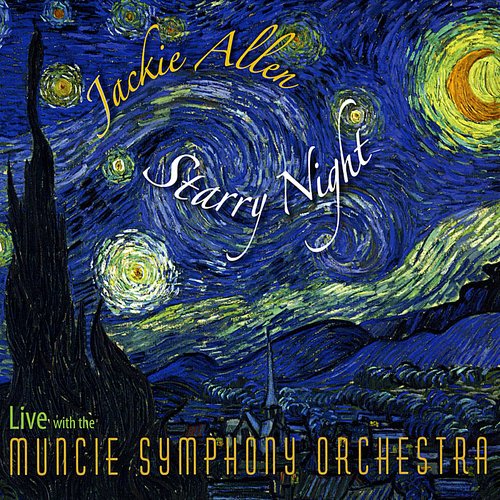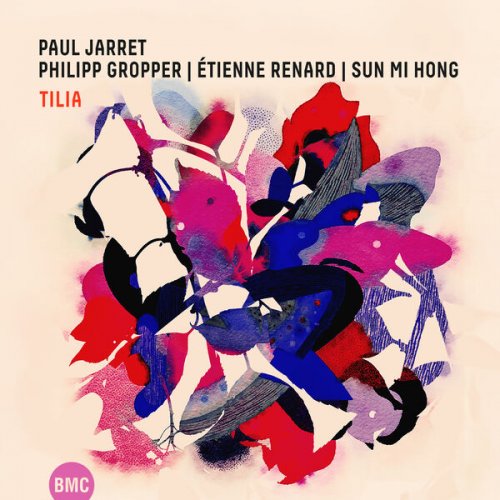Jackie Allen - Starry Night (2009)

Artist: Jackie Allen
Title: Starry Night
Year Of Release: 2009
Label: Avant Bass
Genre: Jazz / Vocal Jazz
Quality: Mp3 / 320kbps
Total Time: 65:05 min
Total Size: 147 MB
WebSite: Album Preview
TracklistTitle: Starry Night
Year Of Release: 2009
Label: Avant Bass
Genre: Jazz / Vocal Jazz
Quality: Mp3 / 320kbps
Total Time: 65:05 min
Total Size: 147 MB
WebSite: Album Preview
----------
01. So Many Stars
02. When In Rome
03. Star Eyes
04. I've Never Been In Love Before
05. You Must Believe In Spring
06. Moon of Deception
07. Lost In the Stars
08. If You Never Come to Me
09. Star Medley: Star Wish, Hush-A-Bye Mountain, The Starlighter
10. Vincent (Starry Starry Night)
11. Star Dust
Jackie Allen – Vocals
Michael Kocour–Piano
John Moulder–Guitar
Hans Sturm–Bass
Dane Richeson–Drums
and The Muncie Symphony Orchestra
I should start off this review with an admission––I am unabashedly a fanboy of Jackie Allen’s work. I like her choice of material, I like her band, and I like how her band shapes the tunes she sings.
The Men in My Life and Love Is Blue rank as two of my favorite albums (they stay pretty active in a CD collection of thousands of discs). So, needless to say, I was excited to see that Allen and her crack band had put out a new CD. And while I might have hoped for a more pared down disc featuring her quintet in a more exciting live setting, Starry Night turns out to be a beautiful CD in its own right.
There seems to have been a lot of effort and care put into the event that produced Starry Night. Allen’s band was brought in to play with the Muncie Symphony Orchestra, and the list of arrangers that made these tunes come to life reads like a Who’s Who of modern big band arranging.
Mark Buselli, John Clayton and Bill Cunliffe, among others, wrote charts for the event, and the talent in the writing and arranging here is evident immediately.
In dissecting Starry Night, the bossa novas are a good place to start. The arrangements, the playing and the delicacy with which they are handled is simply amazing. “So Many Stars” sets the tone for this disc beautifully. Kocour, Sturm, Moulder and Richeson are a beautiful rhythm section, and the strings are an ideal complement. Jackie Allen rides the strings and quartet effectively and it sets up the rest of the disc perfectly.
One of the real gems on Starry Night is the somewhat obscure Jobim composition, “If You Never Come To Me.” Allen sings the verse in Portuguese—it’s unexpected and sets it apart, not only from everything else on the record, but also from most other interpretations of the song.
Michael Kocour’s solo here is exactly what’s called for––he doesn’t try to steal the show. It’s just pretty in a setting where pretty rules.
Sadly, only one of Allen’s originals is on display on Starry Night, “Moon of Deception.” The original music and radical rearrangements of poppier material that have popped up on her last three discs have been nothing short of absolutely fantastic, and Moon of Deception is no exception to that rule.
And when A-B’d against the original recording on Love is Blue, the song clearly benefits from the stringed arrangement. If there’s a sequel to this CD, one hopes that Allen will be more eager to revisit more of her own material.
Of all of the highlights on Starry Night, though, the one that stands out the most is the little-done Coleman-Leigh tune, “When In Rome.”
What makes it so charming is the fact that it swings, which, given the orchestral accompaniment, is quite an achievement in itself. Allen’s phrasing here is why I love her music so much. In the hands of a lesser singer, it could have been over-sung, pushed too hard or been given over to the cheese which all too often plagues the singer-meets-orchestra-summit styled recordings.
Instead, Allen caresses the lyric with a sly bit of charm here, a lift there, and all over just treats the material with the respect it deserves. Granted, it’s the only song in the program that does anything close to swing, but it accomplishes its goals well.
The end result is a beautifully played and overlooked gem from the Great American Songbook in which my only complaint is that Kocour’s piano should have been recorded better.
From a jazz geek’s standpoint, the only problem with Starry Night is the middle-of-the-road nature of the ballads on a singer-and-strings disc. The ballads, by their design, will be syrupy and will likely sound best when sung in a manner that makes a lay-person wonder if there’s a tempo at all.
Those ballad arrangements can’t really be considered jazz, and to tell the truth I am not the person to judge their worth. They’re not at all my bag, and while the musician in me can appreciate them, the music fan in me cannot. So, I will leave the ballads on Starry Night with this: they’re gorgeous, and if you’re planning on using the disc to set a romantic mood, you’ll succeed.
By: Paul Abella
Michael Kocour–Piano
John Moulder–Guitar
Hans Sturm–Bass
Dane Richeson–Drums
and The Muncie Symphony Orchestra
I should start off this review with an admission––I am unabashedly a fanboy of Jackie Allen’s work. I like her choice of material, I like her band, and I like how her band shapes the tunes she sings.
The Men in My Life and Love Is Blue rank as two of my favorite albums (they stay pretty active in a CD collection of thousands of discs). So, needless to say, I was excited to see that Allen and her crack band had put out a new CD. And while I might have hoped for a more pared down disc featuring her quintet in a more exciting live setting, Starry Night turns out to be a beautiful CD in its own right.
There seems to have been a lot of effort and care put into the event that produced Starry Night. Allen’s band was brought in to play with the Muncie Symphony Orchestra, and the list of arrangers that made these tunes come to life reads like a Who’s Who of modern big band arranging.
Mark Buselli, John Clayton and Bill Cunliffe, among others, wrote charts for the event, and the talent in the writing and arranging here is evident immediately.
In dissecting Starry Night, the bossa novas are a good place to start. The arrangements, the playing and the delicacy with which they are handled is simply amazing. “So Many Stars” sets the tone for this disc beautifully. Kocour, Sturm, Moulder and Richeson are a beautiful rhythm section, and the strings are an ideal complement. Jackie Allen rides the strings and quartet effectively and it sets up the rest of the disc perfectly.
One of the real gems on Starry Night is the somewhat obscure Jobim composition, “If You Never Come To Me.” Allen sings the verse in Portuguese—it’s unexpected and sets it apart, not only from everything else on the record, but also from most other interpretations of the song.
Michael Kocour’s solo here is exactly what’s called for––he doesn’t try to steal the show. It’s just pretty in a setting where pretty rules.
Sadly, only one of Allen’s originals is on display on Starry Night, “Moon of Deception.” The original music and radical rearrangements of poppier material that have popped up on her last three discs have been nothing short of absolutely fantastic, and Moon of Deception is no exception to that rule.
And when A-B’d against the original recording on Love is Blue, the song clearly benefits from the stringed arrangement. If there’s a sequel to this CD, one hopes that Allen will be more eager to revisit more of her own material.
Of all of the highlights on Starry Night, though, the one that stands out the most is the little-done Coleman-Leigh tune, “When In Rome.”
What makes it so charming is the fact that it swings, which, given the orchestral accompaniment, is quite an achievement in itself. Allen’s phrasing here is why I love her music so much. In the hands of a lesser singer, it could have been over-sung, pushed too hard or been given over to the cheese which all too often plagues the singer-meets-orchestra-summit styled recordings.
Instead, Allen caresses the lyric with a sly bit of charm here, a lift there, and all over just treats the material with the respect it deserves. Granted, it’s the only song in the program that does anything close to swing, but it accomplishes its goals well.
The end result is a beautifully played and overlooked gem from the Great American Songbook in which my only complaint is that Kocour’s piano should have been recorded better.
From a jazz geek’s standpoint, the only problem with Starry Night is the middle-of-the-road nature of the ballads on a singer-and-strings disc. The ballads, by their design, will be syrupy and will likely sound best when sung in a manner that makes a lay-person wonder if there’s a tempo at all.
Those ballad arrangements can’t really be considered jazz, and to tell the truth I am not the person to judge their worth. They’re not at all my bag, and while the musician in me can appreciate them, the music fan in me cannot. So, I will leave the ballads on Starry Night with this: they’re gorgeous, and if you’re planning on using the disc to set a romantic mood, you’ll succeed.
By: Paul Abella
IsraCloud : Download

![Mal Waldron - Left Alone (Remastered 2014) (2026) [Hi-Res] Mal Waldron - Left Alone (Remastered 2014) (2026) [Hi-Res]](https://www.dibpic.com/uploads/posts/2026-02/1770802366_zssweohuxq7f9_600.jpg)

![Claude Williamson - Round Midnight (Remastered 2014) (2026) [Hi-Res] Claude Williamson - Round Midnight (Remastered 2014) (2026) [Hi-Res]](https://www.dibpic.com/uploads/posts/2026-02/1770854964_cover.jpg)

![Amir Bresler - See What Happens (2026) [Hi-Res] Amir Bresler - See What Happens (2026) [Hi-Res]](https://www.dibpic.com/uploads/posts/2026-02/1770897850_nf8k6u63fp38i_600.jpg)
![Jacob Anderskov - Vinterstemmer (2026) [Hi-Res] Jacob Anderskov - Vinterstemmer (2026) [Hi-Res]](https://www.dibpic.com/uploads/posts/2026-02/1771036914_d0s5qxbxc5g5l_600.jpg)
![Greg Foat - Opening Time (Library Edits) (2026) [Hi-Res] Greg Foat - Opening Time (Library Edits) (2026) [Hi-Res]](https://img.israbox.com/img/2026-02/11/bthy9h8xur67bx2ig50pfmfkm.jpg)
